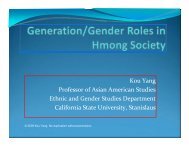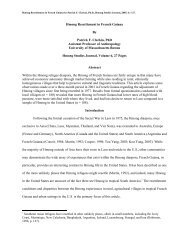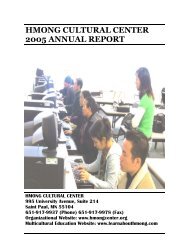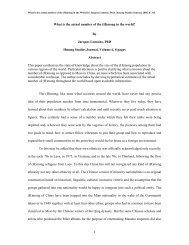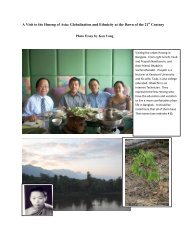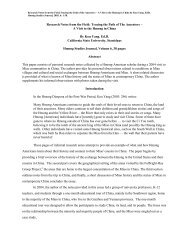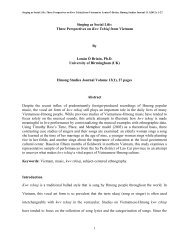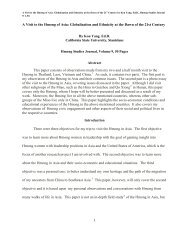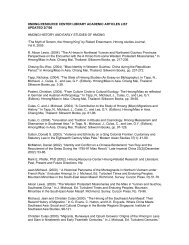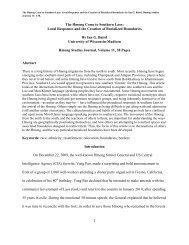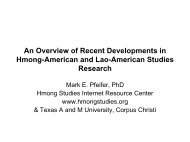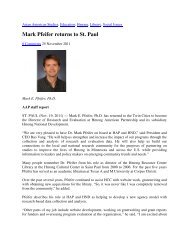Hmong and Lao Refugee Women - Hmong Studies Internet ...
Hmong and Lao Refugee Women - Hmong Studies Internet ...
Hmong and Lao Refugee Women - Hmong Studies Internet ...
Create successful ePaper yourself
Turn your PDF publications into a flip-book with our unique Google optimized e-Paper software.
<strong>Hmong</strong> <strong>and</strong> <strong>Lao</strong> <strong>Refugee</strong> <strong>Women</strong>: Reflections of a <strong>Hmong</strong>-American Woman Anthropologist by Dia Cha, Ph.D. <strong>Hmong</strong> <strong>Studies</strong> Journal,<br />
2005, 6: 1-35.<br />
herself as a Western feminist – not only attempting to impose her own values <strong>and</strong> views on the women of<br />
the camps, but also attempting to stimulate controversy on a variety of social <strong>and</strong> political issues, the<br />
ultimate result of which would be to make their work more difficult than otherwise. Some of these<br />
directors expressly cautioned the author not to assist the refugees, lest such assistance step on the toes of<br />
others present in the camps. Still others expressly voiced the expectation that all research findings –<br />
indeed, all information of any sort whatsoever – would, without question or demur, be shared with them.<br />
The Author Reflects<br />
In considering her role in this project, the author came to see herself as a figure who, much of the<br />
time, acted as an intermediary between a great many opposing forces, <strong>and</strong> who, accordingly, was required<br />
to wear play many roles. One of these roles was that of fellow <strong>Hmong</strong> refugee, sharing similar<br />
experiences <strong>and</strong> common values with camp residents. Such values included the recognition that, although<br />
the current <strong>Lao</strong> government had altered its policies considerably to accommodate itself to modern<br />
st<strong>and</strong>ards <strong>and</strong> norms of conduct with respect to human rights, nevertheless it continued to violate those<br />
same st<strong>and</strong>ards with alarming regularity. These violations included the imprisonment of former<br />
government officials without trial, in some cases for terms of over ten years. Such values also included<br />
the belief that the <strong>Lao</strong> government did not, in fact, wish the repatriation of refugees, but, due to<br />
international pressure, nevertheless continued to make a political gesture by accepting them. The<br />
ostensibly shared set of beliefs <strong>and</strong> values included, as well, the consideration that, although the <strong>Lao</strong><br />
government had made it a policy to discourage discrimination inside <strong>Lao</strong>s, in practice discrimination was<br />
still widely practiced by the <strong>Lao</strong> Lum against the <strong>Hmong</strong> <strong>and</strong> other ethnic groups in <strong>Lao</strong>s. In addition,<br />
this set of shared considerations included a concern on the part of refugee women that, upon return to<br />
<strong>Lao</strong>s, all returnees would be tarred with the brush of the resistance in which only some returnees were<br />
involved; this, they feared, would result in the indiscriminate arrest of returnee males, with all of the<br />
attendant emotional <strong>and</strong> material hardship to returnee females.<br />
In contrast to these refugee women, however, who, after all, had no citizenship affiliation, the<br />
author was indisputably an American citizen, with all the security <strong>and</strong> socioeconomic opportunity that<br />
26



